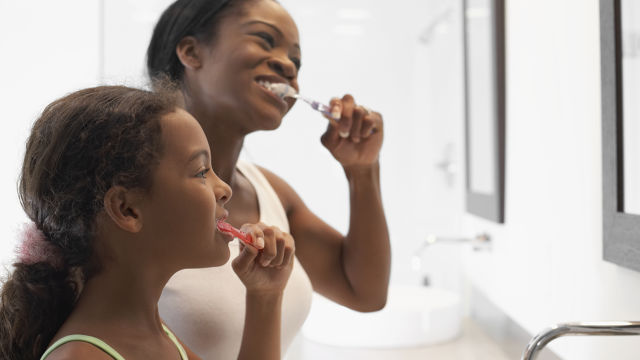Alle artikelen over mondgezondheid
46 results

Fluoride
Wat is fluoride?
Fluoride is een natuurlijk mineraal dat overal in de aardkorst en in de natuur te vinden is. Bepaald eten en water bevat fluoride. Hoe...
Meer lezen
Slechte adem (halitose)
De oorzaken van een slechte adem begrijpen
Wat zijn de oorzaken van een slechte adem? Kom te weten hoe je halitose doeltreffend kunt behandelen en hoe je je mondgezondheid kunt verbeteren.
Meer lezen
Slechte adem (halitose)
Slechte adem en de relatie met orale en systemische aandoeningen
“Ongeveer 75 procent van slechte adem of 'halitose' ontstaat in de mond zelf. Andere oorzaken zijn maagproblemen, sinusinfecties of...
Meer lezen
Slechte adem (halitose)
Belangrijk bij het behandelen van een slechte adem
Als u echt wilt weten wat de oorzaak is van uw slechte adem, kunt u overwegen een afspraak met uw tandarts te maken. Aan de hand van uw...
Meer lezen
Droge mond
Wat is een droge mond en wat kan je er tegen doen ?
Als je vaak last hebt van een droge mond, kan dit een symptoom zijn van ernstige gezondheidsproblemen. De oorzaken begrijpen en...
Meer lezen
Tanden bleken
Welke voeding eten of vermijden om een stralende glimlach te behouden?
Ontdek hoe bepaalde voeding vlekken op je tanden kan veroorzaken of je tanden witter kan maken. Leer slim eten en drinken om je stralende glimlach te behouden.
Meer lezen
Tanden bleken
Thuis je tanden bleken
Ontdek de verschillende manieren om thuis je tanden te bleken, met name whitening strips, serums en kits.
Meer lezen
Tanden bleken
Hoe verloopt de behandeling glazuur-microabrasie?
Ontdek wat de techniek microabrasie van de tanden inhoudt en hoe deze je tanden witter kan maken.
Meer lezen
Tanden bleken
Kan ik mijn tanden poetsen na het gebruik van whitening strips?
Als je graag een stralende, witte glimlach wilt om je zelfvertrouwen een boost te geven, dan kan je kiezen voor whitening oplossingen...
Meer lezen
Tanden bleken
Hoe gaat het bleken van tanden in z'n werk?
Er zijn veel manieren om uw tanden te bleken — van witmakende tandpasta en andere producten die vlekken goedkoop kunnen verwijderen, tot...
Meer lezen
Tanden bleken
Hoelang duurt het effect van LED whitening?
Whitening met LED licht wordt steeds populairder als het gaat om tanden bleken. Het is een uitstekende manier om een stralend witte...
Meer lezen
Tanden bleken
Hoe veilig zijn vrij verkrijgbare producten om tanden witter te maken?
Met zoveel vrij verkrijgbare whitening producten in de aanbieding is het makkelijker dan ooit om een stralend witte glimlach te verkrijgen. Lees meer over hoe veilig deze producten precies zijn.
Meer lezen
Tanden bleken
Hoe kies je de beste tandenbleekset?
Als je de eerste stap zet in de wereld van de tandenbleeksets, ben je hier aan het juiste adres. Als experts in alles wat met...
Meer lezen
Tanden bleken
Hoe gebruik je een whitening pen?
Met de uitgebreide selectie van tand whitening producten is het tegenwoordig eenvoudiger dan ooit om je prachtige, witte lach te...
Meer lezen
Tanden bleken
Een mooiere glimlach
Welke factoren beïnvloeden de kleur van mijn tanden? Sommige mensen hebben gelere tanden dan anderen. Van andere mensen worden de tanden...
Meer lezen
Tanden bleken
Is het bleken van tanden veilig?
Niets boezemt meer vertrouwen in dan een prachtige glimlach. Met een parelwitte glimlach ben je overal het stralende middelpunt. Toch...
Meer lezen
Tanden bleken
Kosten laser whitening
Wat is laser whitening? Ben je geïnteresseerd in een laser whitening behandeling om een stralend witte glimlach te verkrijgen? Wij...
Meer lezen
Tanden bleken
De gevaren van doe-het-zelf whitening kits
Er zijn heel wat doe-het-zelf-opties voorhanden om je tanden witter te maken en een stralende glimlach te bekomen. Hier vind je meer informatie over whitening kits voor thuis en de gevaren die erbij komen kijken.
Meer lezen
Tanden bleken
Wat is tandenbleekgel?
Ontdek meer over tandenbleekgel, een populaire methode om een wittere glimlach te krijgen. Krijg tips over hoe je het effectief kunt gebruiken, mogelijke risico’s en bijwerkingen, en hoe je de resultaten kunt behouden.
Meer lezen
Tanden bleken
Wat werkt het beste om koffievlekken van je tanden te verwijderen?
Verkleurde tanden zijn niet ongewoon en al zeker niet als je sterk gekleurde etenswaren en dranken nuttigt, zoals koffie. Ontdek wat het beste werkt om koffievlekken van je tanden te verwijderen.
Meer lezen
Tanden bleken
Whitening strips voor gevoelige tanden
Whitening strips voor gevoelige tanden Veel mensen streven naar een schitterende lach. Tanden bleken is een geliefde methode om onze...
Meer lezen
Tanden bleken
Waarom zou ik mijn tanden moeten laten bleken?
Misschien heeft u altijd al een mooie, witte glimlach gewild. Of wellicht zijn uw tanden met de jaren geler geworden. Of misschien bent...
Meer lezen
Tanden bleken
Hoe kies je de tandbleekbehandeling die het meest geschikt is voor jou?
Je gaat misschien binnenkort trouwen. Of je verwacht een drukke periode voor de internationale activiteiten van je bedrijf. In welke...
Meer lezen
Tanden bleken
Hoe kies je de beste manier om je tanden te bleken?
Een stralende glimlach is de wens van velen onder ons. Onze dagelijkse consumptie van koffie, zwarte thee, frisdranken en...
Meer lezen
Tanden bleken
Hoe kun je vlekken op je tanden voorkomen als je een beugel draagt?
Het dragen van een beugel is een van de vele manieren om een glimlach met rechte tanden te krijgen. Soms kan een beugel echter...
Meer lezen
Tanden bleken
Wat zijn de beste oplossingen om je tanden te bleken met onmiddellijk resultaat?
De huidige bleektechnologie voor witte tanden is sneller, veiliger en efficiënter dan vroeger. In de winkel is er een ruim aanbod aan...
Meer lezen

Tandenknarsen (bruxisme)
Bruxisme: hoe kan je 's nachts ophouden met tandenknarsen?
Tandenknars jij wel eens? Ontdek de symptomen, de oorzaken en hoe je bruxisme kunt behandelen.
Meer lezen
Tandenknarsen (bruxisme)
Bruxisme/Tandenknarsen: signalen en symptomen
Wat is tandenknarsen? Als u 's morgens wakker wordt met pijnlijke kaakspieren of hoofdpijn, lijdt u mogelijk aan tandenknarsen...
Meer lezen
Begeleiding voor tandheelkundige producten
Het kiezen van de juiste tandenborstel
Wat voor een type tandenborstel moet ik gebruiken? Er zijn zo veel verschillende vormen, afmetingen en stijlen in tandenborstels...
Meer lezen
Begeleiding voor tandheelkundige producten
Ben je allergisch voor tandpasta?
Allergieën kunnen in verschillende vormen voorkomen , van tranende ogen en jeuk, tot een gezwollen tong, tot vernauwde luchtwegen....
Meer lezen
Mondzweren en infecties
Is tandpasta doeltreffend op een koortslip en aften?
Als je een koortslip hebt, dan ken je misschien een middeltje uit grootmoeders tijd dat zegt dat je er tandpasta moet op aanbrengen. Maar helpt dat wel echt?
Meer lezen
Mondzweren en infecties
Mondirritaties en -aandoeningen
Mondhygiëne is een belangrijk aspect van ons algemeen welzijn. Enkele veelvoorkomende problemen zijn aften en mondzweertjes. Deze...
Meer lezen

Mondverzorging: Volwassenen (18+)
Mondpiercings
Wat zijn mondpiercings? Onder mondpiercings verstaan we piercings in de tong, lippen of wangen. De laatste jaren zijn piercings in de...
Meer lezen
Mondverzorging: Volwassenen (18+)
Wat zijn kronen en bruggen?
Zowel kronen als de meeste bruggen zijn vaste prothesen. In tegenstelling tot uitneembare prothesen zoals een kunstgebit of een plaatje,...
Meer lezen
Mondverzorging: Volwassenen (18+)
Wat zijn implantaten?
Implantaten zijn metalen staafjes of plaatjes die via een chirurgische ingreep onder het tandvlees in het kaakbeen worden geplaatst....
Meer lezen
Mondverzorging: Volwassenen (18+)
Waaruit bestaat een goede mondhygiëne?
Een goede mondhygiëne resulteert in een gezond ogende en fris ruikende mond. Dit houdt het volgende in: het gebit is schoon en vrij van...
Meer lezen
Mondverzorging: Volwassenen (18+)
Hoe houden tieners een stralend en gezond gebit?
Een tiener die een aantrekkelijk en gezond gebit wil behouden, moet gewoon doorgaan met de gezonde gewoonten die hij of zij als kind...
Meer lezen
Tandplak en tandsteen
Wat is tandsteen?
Tandsteen (calculus) is een hard geworden vorm van tandplak op uw tanden. Ook op en onder de tandvleesrand kan zich tandsteen vormen,...
Meer lezen
Kaakpijn (TMD)
Wat is Temporomandibulaire Disfunctie (TMD)?
Wat is TMD? TMD, of temporomandibulaire disfunctie, betekent dat de scharnierende verbinding tussen het bovenste en het onderste...
Meer lezen
Vullingen
Wat is een vulling?
Met behulp van een vulling herstelt de tandarts de normale functie en vorm van een door tandbederf aangetaste tand of kies. Eerst...
Meer lezen
Poetsen en flossen
Mondverzorging voor het hele gezin
Als u deze informatie opvolgt, dan kunnen u en uw gezin een leven lang gezonde tanden en gezond tandvlees behouden. Als ouder kunt u met...
Meer lezen
Poetsen en flossen
Hoe tanden te poetsen
Wat is de juiste manier om te poetsen? Een goede poetsbeurt duurt minstens twee minuten. De meeste volwassenen poetsen veel te kort. Als...
Meer lezen
Gevoeligheid van de tanden
Hoe kun je de pijn na het bleken van je tanden verlichten?
Soms kan het zijn dat je na het bleken van je tanden gevoeliger bent voor koude of warme dranken en voedsel en zelfs pijn aan je...
Meer lezen
Tandheelkundige bonding
Welke factoren beïnvloeden de kleur van mijn tanden?
Sommige mensen worden geboren met tanden die wat geler zijn dan normaal. En bij anderen verkleuren de tanden bij het ouder worden. Uw...
Meer lezenQuiz over mondgezondheid
Wat zit er achter uw glimlach?
Doe onze Mondgezondheidstest om alles uit uw mondverzorging te halen
Quiz over mondgezondheid
Wat zit er achter uw glimlach?
Doe onze Mondgezondheidstest om alles uit uw mondverzorging te halen





